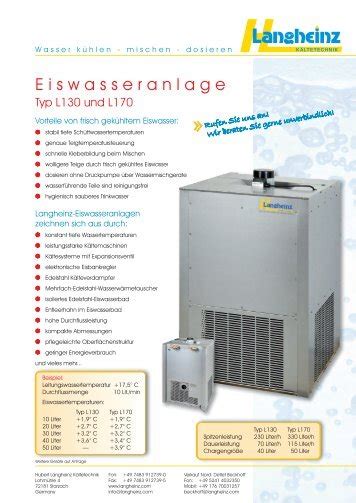Unlock the Power of Efficiency with Eiswasseranlage: A Comprehensive Guide

Unlock the Power of Efficiency with Eiswasseranlage: A Comprehensive Guide
Introduction
In todays energy-conscious world, industries are constantly seeking ways to optimize their operations and minimize costs. One crucial aspect of industrial efficiency is temperature control, and this is where Eiswasseranlage shines. This cutting-edge technology offers a sustainable and cost-effective solution for a wide range of cooling applications.
What is Eiswasseranlage?
Eiswasseranlage, also known as chilled water systems, are central cooling systems that use chilled water as a coolant to regulate temperatures within industrial processes and facilities. These systems are highly efficient and can significantly reduce energy consumption compared to traditional cooling methods.
Benefits of Eiswasseranlage
Energy Efficiency: Eiswasseranlage utilizes advanced cooling technologies to maximize energy efficiency. By circulating chilled water through heat exchangers, they can effectively remove heat from critical equipment without wasting energy.
Cost Savings: The energy efficiency of Eiswasseranlage translates into substantial cost savings for industries. According to the U.S. Department of Energy, chilled water systems can reduce energy consumption by up to 30%.
Enhanced Productivity: Optimal cooling conditions provided by Eiswasseranlage help maintain stable temperatures, ensuring smooth operation of machinery and processes. This can enhance productivity and minimize downtime.
Environmental Sustainability: Eiswasseranlage promotes environmental sustainability by reducing energy consumption and carbon emissions. They also utilize environmentally friendly refrigerants, minimizing their environmental impact.
How Eiswasseranlage Works
Eiswasseranlage consists of several key components:
* Chiller: The chiller unit cools the water by removing heat from it through refrigeration.
* Condenser: The condenser releases the heat absorbed by the chiller into the ambient air or water.
* Cooling Tower: The cooling tower cools the condenser water by evaporating a small portion of it.
* Pumps: Pumps circulate the chilled water throughout the system.
Types of Eiswasseranlage
Eiswasseranlage can be classified into two main types:
* Air-Cooled Systems: These systems use air as the cooling medium for the condenser. They are typically more compact and require less maintenance.
* Water-Cooled Systems: These systems use water as the cooling medium for the condenser. They are more efficient but require a cooling tower and are more complex.
Applications of Eiswasseranlage
Eiswasseranlage finds applications in various industrial sectors, including:
* Plastics Industry: Cooling molds and extruders.
* Metalworking Industry: Cooling cutting tools and machinery.
* Chemical Industry: Controlling process temperatures.
* Pharmaceutical Industry: Maintaining temperature-sensitive products.
* Data Centers: Cooling servers and IT equipment.
Case Studies
* Automotive Manufacturer: A leading automotive manufacturer installed an Eiswasseranlage at its assembly plant, reducing energy consumption by 20% and saving over €1 million annually.
* Pharmaceutical Company: A pharmaceutical company used an Eiswasseranlage to maintain precise temperatures in its manufacturing facility, ensuring the quality and shelf life of its products.
* Data Center Provider: A large data center provider implemented an Eiswasseranlage to cool its servers, resulting in a 15% reduction in energy costs and improved server performance.
Common Misconceptions about Eiswasseranlage
Misconception: Eiswasseranlage is only suitable for large-scale industries.
Truth: Eiswasseranlage can be tailored to meet the cooling needs of industries of all sizes, from small workshops to large manufacturing facilities.
Misconception: Eiswasseranlage is expensive to install and maintain.
Truth: While the initial investment for an Eiswasseranlage can be significant, the long-term cost savings and energy efficiency make it a worthwhile investment. Additionally, modern Eiswasseranlage are designed for low maintenance and high durability.
Misconception: Eiswasseranlage is not environmentally friendly.
Truth: Eiswasseranlage uses environmentally friendly refrigerants and promotes energy efficiency, contributing to environmental sustainability.
Conclusion
Eiswasseranlage offers a comprehensive and efficient solution for industrial temperature control. Its ability to significantly reduce energy consumption, improve productivity, and enhance sustainability makes it an indispensable tool for industries seeking to optimize their operations. By embracing Eiswasseranlage, industries can unlock the power of efficiency and drive their competitiveness in todays demanding market.
